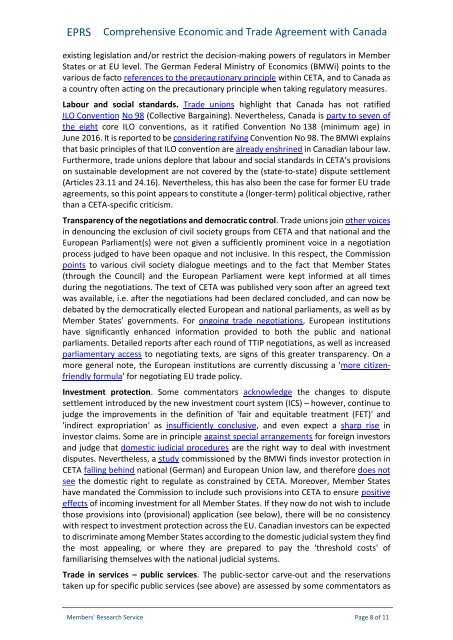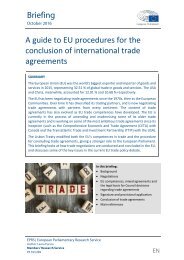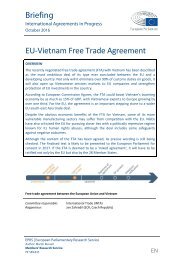Comprehensive Economic and Trade Agreement (CETA) with Canada
2iQ3UOo
2iQ3UOo
You also want an ePaper? Increase the reach of your titles
YUMPU automatically turns print PDFs into web optimized ePapers that Google loves.
EPRS<br />
<strong>Comprehensive</strong> <strong>Economic</strong> <strong>and</strong> <strong>Trade</strong> <strong>Agreement</strong> <strong>with</strong> <strong>Canada</strong><br />
existing legislation <strong>and</strong>/or restrict the decision-making powers of regulators in Member<br />
States or at EU level. The German Federal Ministry of <strong>Economic</strong>s (BMWi) points to the<br />
various de facto references to the precautionary principle <strong>with</strong>in <strong>CETA</strong>, <strong>and</strong> to <strong>Canada</strong> as<br />
a country often acting on the precautionary principle when taking regulatory measures.<br />
Labour <strong>and</strong> social st<strong>and</strong>ards. <strong>Trade</strong> unions highlight that <strong>Canada</strong> has not ratified<br />
ILO Convention No 98 (Collective Bargaining). Nevertheless, <strong>Canada</strong> is party to seven of<br />
the eight core ILO conventions, as it ratified Convention No 138 (minimum age) in<br />
June 2016. It is reported to be considering ratifying Convention No 98. The BMWi explains<br />
that basic principles of that ILO convention are already enshrined in Canadian labour law.<br />
Furthermore, trade unions deplore that labour <strong>and</strong> social st<strong>and</strong>ards in <strong>CETA</strong>’s provisions<br />
on sustainable development are not covered by the (state-to-state) dispute settlement<br />
(Articles 23.11 <strong>and</strong> 24.16). Nevertheless, this has also been the case for former EU trade<br />
agreements, so this point appears to constitute a (longer-term) political objective, rather<br />
than a <strong>CETA</strong>-specific criticism.<br />
Transparency of the negotiations <strong>and</strong> democratic control. <strong>Trade</strong> unions join other voices<br />
in denouncing the exclusion of civil society groups from <strong>CETA</strong> <strong>and</strong> that national <strong>and</strong> the<br />
European Parliament(s) were not given a sufficiently prominent voice in a negotiation<br />
process judged to have been opaque <strong>and</strong> not inclusive. In this respect, the Commission<br />
points to various civil society dialogue meetings <strong>and</strong> to the fact that Member States<br />
(through the Council) <strong>and</strong> the European Parliament were kept informed at all times<br />
during the negotiations. The text of <strong>CETA</strong> was published very soon after an agreed text<br />
was available, i.e. after the negotiations had been declared concluded, <strong>and</strong> can now be<br />
debated by the democratically elected European <strong>and</strong> national parliaments, as well as by<br />
Member States’ governments. For ongoing trade negotiations, European institutions<br />
have significantly enhanced information provided to both the public <strong>and</strong> national<br />
parliaments. Detailed reports after each round of TTIP negotiations, as well as increased<br />
parliamentary access to negotiating texts, are signs of this greater transparency. On a<br />
more general note, the European institutions are currently discussing a 'more citizenfriendly<br />
formula' for negotiating EU trade policy.<br />
Investment protection. Some commentators acknowledge the changes to dispute<br />
settlement introduced by the new investment court system (ICS) – however, continue to<br />
judge the improvements in the definition of 'fair <strong>and</strong> equitable treatment (FET) ' <strong>and</strong><br />
'indirect expropriation' as insufficiently conclusive, <strong>and</strong> even expect a sharp rise in<br />
investor claims. Some are in principle against special arrangements for foreign investors<br />
<strong>and</strong> judge that domestic judicial procedures are the right way to deal <strong>with</strong> investment<br />
disputes. Nevertheless, a study commissioned by the BMWi finds investor protection in<br />
<strong>CETA</strong> falling behind national (German) <strong>and</strong> European Union law, <strong>and</strong> therefore does not<br />
see the domestic right to regulate as constrained by <strong>CETA</strong>. Moreover, Member States<br />
have m<strong>and</strong>ated the Commission to include such provisions into <strong>CETA</strong> to ensure positive<br />
effects of incoming investment for all Member States. If they now do not wish to include<br />
those provisions into (provisional) application (see below), there will be no consistency<br />
<strong>with</strong> respect to investment protection across the EU. Canadian investors can be expected<br />
to discriminate among Member States according to the domestic judicial system they find<br />
the most appealing, or where they are prepared to pay the 'threshold costs' of<br />
familiarising themselves <strong>with</strong> the national judicial systems.<br />
<strong>Trade</strong> in services – public services. The public-sector carve-out <strong>and</strong> the reservations<br />
taken up for specific public services (see above) are assessed by some commentators as<br />
Members' Research Service Page 8 of 11




